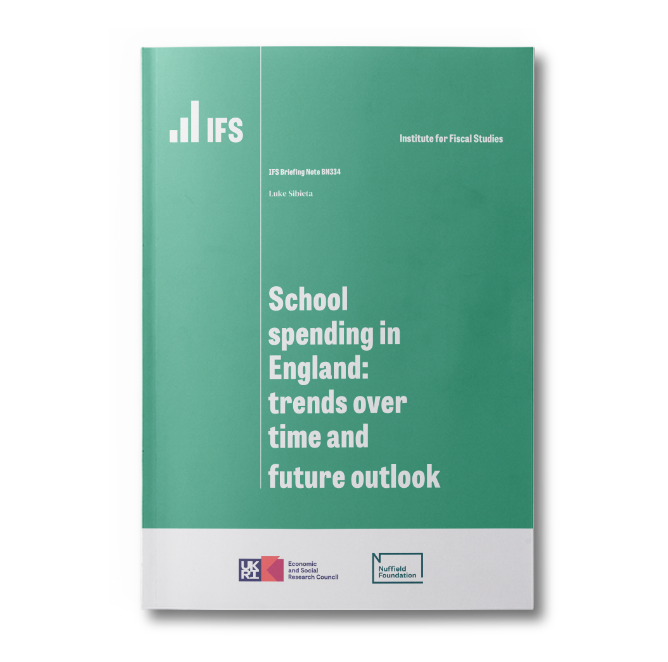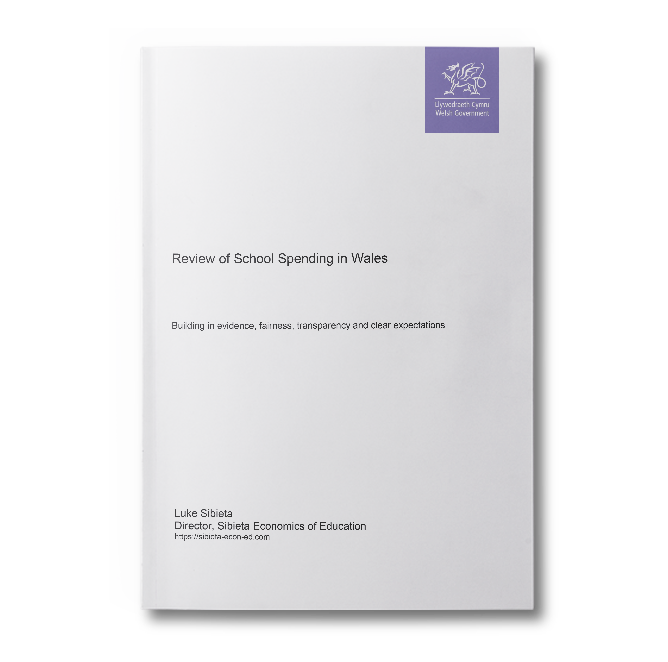
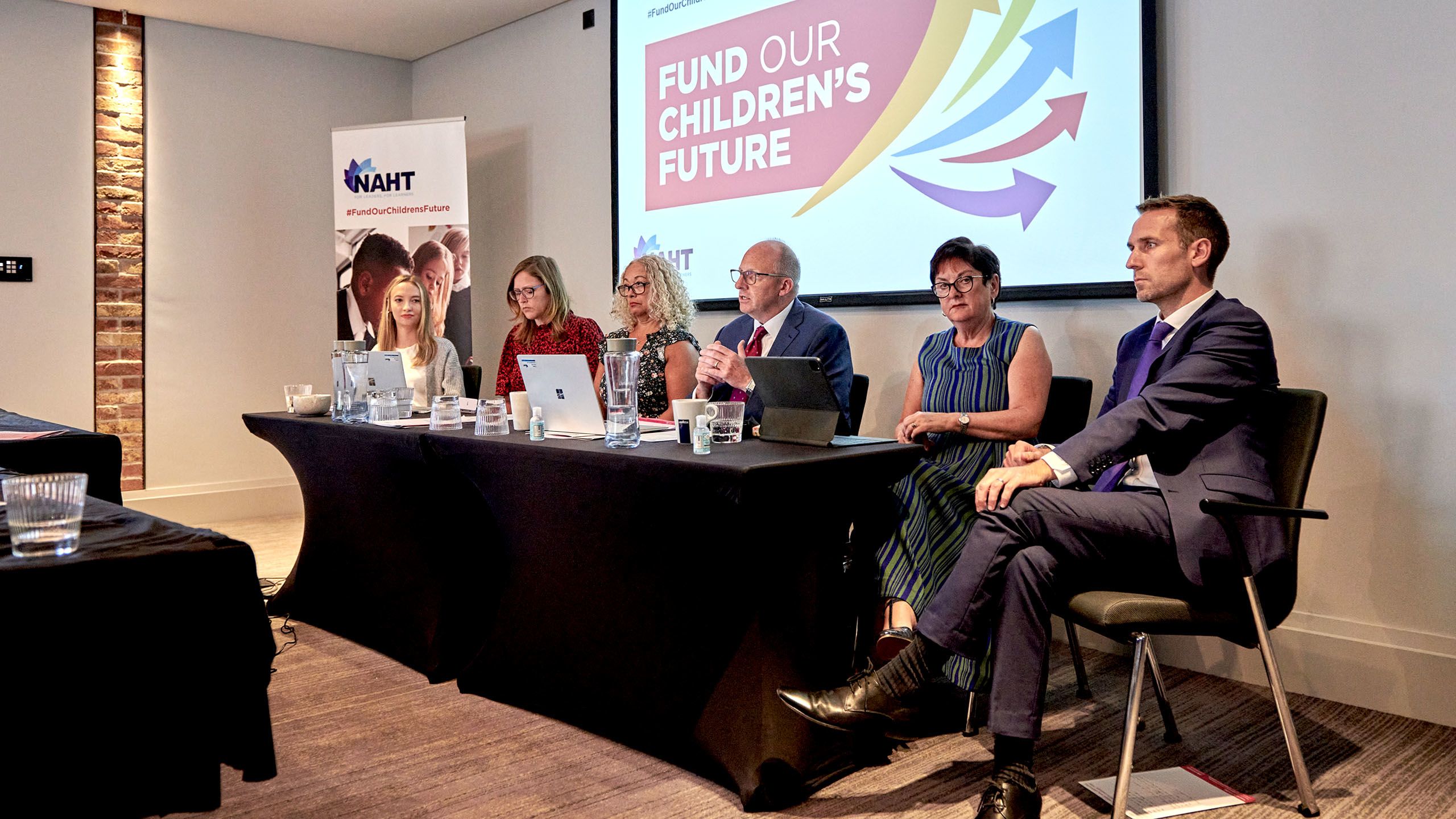
Leadership Focus journalist Nic Paton looks at the financial pressures NAHT members are currently under and why vital funding is needed more than ever.
By the time you’re reading this, we could all be very pleasantly surprised. With chancellor Rishi Sunak due to deliver his comprehensive spending review and autumn budget on 27 October, there is – one has to suppose – at least an outside chance that education may suddenly find itself being showered with post-covid-19 gold.
However, given this government’s track record when it comes to loosening the purse strings – scrabbling down the back of the sofa for some loose change for covid-19 recovery rather than the transformational financial package the government’s education recovery commissioner Sir Kevan Collins was looking for last summer; raiding national insurance for social care reform rather than looking for a more equitable taxation approach and implementing a pay freeze for teachers for 2021/22 – perhaps it’s best if none of us gets our hopes up too high.

NAHT general secretary Paul Whiteman addressing MPs at the ‘A failure to invest: the state of school funding in 2021’ report's launch event.
What’s more, irrespective of whatever financial rabbits Rishi pulls out the proverbial hat this autumn, the reality is that education funding needs much more than just a one-off post-covid-19 cash injection, as NAHT general secretary Paul Whiteman makes clear.
“Any extra money that is forthcoming from the government is, of course, welcome, especially extra finance to assist with covid-19 recovery. But, for me, when it comes to education funding, we need to be talking about much more than a short-term ‘recovery’ settlement,” Paul tells Leadership Focus.
“We – the government with unions and the wider profession – have to look beyond what recovery looks like, which should be short term, and really see this as a moment of wholesale financial reform for education,” he adds.
This need for a new funding settlement – and, in fact, a whole new funding conversation – was starkly illustrated in September by the launch of an NAHT report, ‘A failure to invest: the state of school funding in 2021’ (available at www.naht.org.uk/RD/A-failure-to-invest).
This laid bare the intense and heart-breaking financial pressures NAHT members are currently under, with a third of school leaders being forced to make cuts to balance their budgets this year and the numbers set to rise next year.
Special educational needs and disabilities (SEND) provision was in a particular state of crisis. Still, the report showed that crumbling infrastructure and unfunded rising employment costs were also significant and growing headaches for school leaders.
NAHT’s report echoed more high-level analysis by the Institute of Fiscal Studies (IFS), published this autumn, which concluded that, despite the government’s allocation of more than £7bn extra for schools in England in the 2019 spending round, core spending per pupil in 2022/23 will still be 1% to 2% lower in real terms than in 2009/10. In fact, the IFS has argued, school spending per pupil fell in England by 9% in real terms between 2009/10 and 2019/20.
Of course, that £7bn figure sounds a lot – and on paper it is – but the reality is it’s just a fraction of what’s needed, especially now with the financial impact of covid-19, highlights NAHT policy director James Bowen.

James Bowen, NAHT policy director at the launch.
“It sounds like an enormous sum of money, but you have to remember, first of all, it is divided out over three years, and it’s also divided out over a lot of schools and a growing number of pupils. So, what starts by sounding like a big headline, when you get it down to the individual school level and over three to four years, it suddenly isn’t a big figure at all,” he explains.
“It’s also important to look at how funding is being allocated – we know that the government’s current approach has seen those schools serving the most deprived communities receiving the biggest cuts.
“As the IFS makes clear, despite the £7.1bn (when you take into account inflation), school funding overall will still be below where it was in 2009/10. This explains why members are saying they still have to make cuts and why budgets are under enormous pressure. Then, of course, on top of all that, we’ve got the added covid-19 costs,” he adds.
“The reality is that so much of a school’s budget is based around staffing, so if you have to make serious, substantial cuts, it is very hard to avoid cutting your staffing budget.

“There is only so much you can save on things like paper and photocopying. When you are talking about tens of thousands of pounds, if not more, you are looking at staffing costs. If you reduce staff and teachers, that has an impact on the provision you can make for the children,” James adds.

NAHT general secretary Paul Whiteman addressing MPs at the ‘A failure to invest: the state of school funding in 2021’ report's launch event.
NAHT general secretary Paul Whiteman addressing MPs at the ‘A failure to invest: the state of school funding in 2021’ report's launch event.

James Bowen, NAHT policy director at the launch.
James Bowen, NAHT policy director at the launch.
To hammer home these messages and make clear to MPs and the government the reality for school leaders on the ground, NAHT briefed MPs in September to make a case for education to be properly funded in October’s comprehensive spending review.
Liberal Democrat MP, deputy leader and education spokesperson Daisy Cooper added that the report ought to “act as a trigger, a warning light, in Whitehall”. Teachers, she said, were facing “unconscionable choices” in their schools about whether to cut full-time teachers, TAs or anything else.
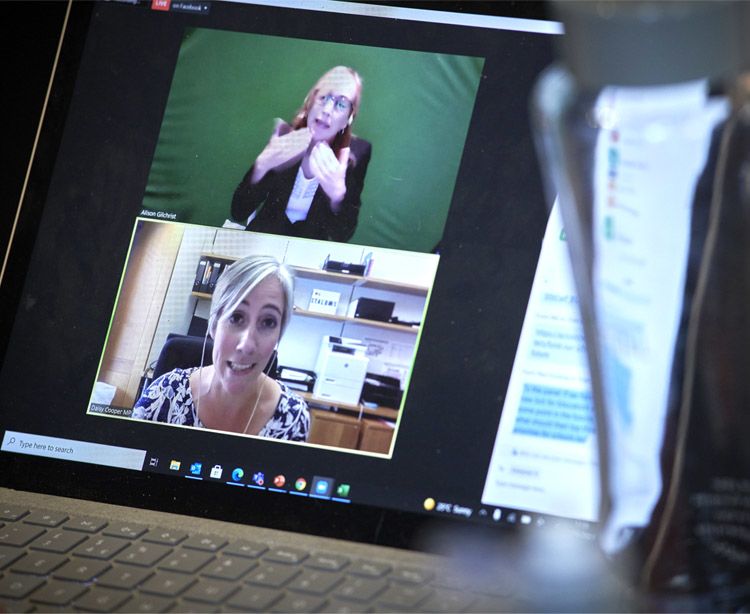
Liberal Democrat MP, deputy leader and education spokesperson Daisy Cooper speaking via Zoom at the meeting.
SEND provision, in turn, was “completely and utterly broken”, with the Liberal Democrats calling for a SEND-specific recovery plan to be put in place by the government.
What, then, should NAHT members be doing to push and promote the campaign?
“We’d like to encourage members to engage their MPs in every constituency, in every community. To highlight and educate those MPs about what is really going on in terms of school funding rather than just what the Department for Education (DfE) is saying. The reality at the coalface is very different from the DfE’s ‘you’ve never had it so good’,” Rob Kelsall, NAHT national secretary, tells Leadership Focus.
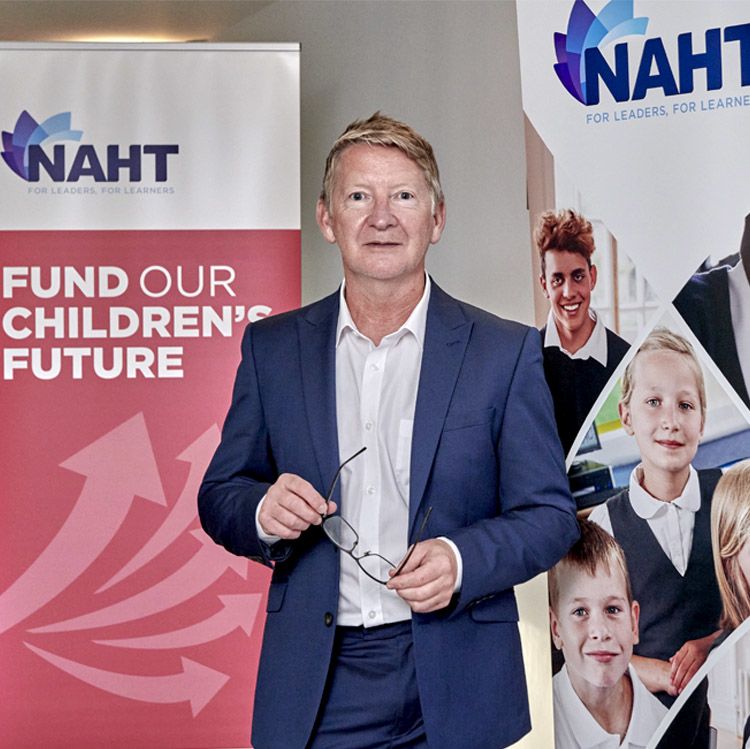
NAHT national secretary Rob Kelsall at the London launch.
“Head teachers and school leaders are very skilled at making good of bad government policy around education and papering over the cracks. It’s now once again about sticking our heads over the parapet and speaking out publicly. We’ve demonstrated before how, by working with parents, we can make our voice heard in the corridors of power, and it is clear that we will need to do that once again.
“For us, when we set off on this campaign five years ago, we said that we wouldn’t stop until we get the government – whatever government, and whatever colour politically – to fund our education service sufficiently and properly.
“There is quiet optimism that the government is already in a situation where it is going to have to come up with something. I think there will be some monies there. Will it be enough? Almost certainly not. If it is not enough, we will continue, and we will continue until the investment is forthcoming. We’re not going away; we said that five years ago, and we’re still saying it.
“Our campaign has been relentless and reasonable. We will continue to fight until we secure greater investment for all children and young people across all of our nations,” Rob adds.
As Paul makes clear, adequate and – crucially – sustained funding for education needs to be a conversation that goes way beyond this autumn’s spending round, covid-19 recovery or a single funding or even parliamentary cycle.
“My call now is, let’s be ambitious about what we want to do with education. The generation of children in school right now is the one that will have to deal with all the issues we have. And they are vocal over Brexit, and they are vocal over climate change. They are vocal over economic and social inequality, but also they’re very vocal over the whole inclusivity agenda too,” he says.
“They see that as a betrayal, and we have got to put that right. Not just for their good but for the good of us all, actually.
“We need to be having good conversations around the better, smarter use of technology within schools, where technology is used to enhance the teaching experience and improve pedagogy rather than simply being a tool to save money.


Liberal Democrat MP, deputy leader and education spokesperson Daisy Cooper speaking via Zoom at the meeting.
Liberal Democrat MP, deputy leader and education spokesperson Daisy Cooper speaking via Zoom at the meeting.

NAHT national secretary Rob Kelsall at the London launch.
NAHT national secretary Rob Kelsall at the London launch.
WHAT THE REPORT BY IFS SAID
The Institute of Fiscal Studies’ (IFS) report, ‘School spending in England: trends over time and future outlook’, published in September, was damning in its conclusions.
Despite the government’s allocation of more than £7bn extra for schools in England in the 2019 spending round, core spending per pupil in 2022/23 will still be about 1% to 2% lower in real terms than in 2009/10, it calculated. Schools’ spending per pupil fell in England by 9% in real terms between 2009/10 and 2019/20.
Those schools serving the most disadvantaged pupils had seen the biggest cuts over the last decade. The national funding formula for schools introduced in 2018 had ensured extra funding flows to areas that have become more disadvantaged over time. “However, as a whole, the formula has provided a bigger funding boost to more affluent areas than to disadvantaged areas,” it added.
Other key findings from the research, funded by the Nuffield Foundation, include the following:
- In England, total schools’ spending per pupil was just more than £6,500 in the latest complete year of data in 2019/20. This was 9% lower in real terms than its high point of £7,200 in 2009/10
- The government’s extra £7.1bn for schools in England through to 2022/23 will increase spending per pupil by more than 8%. However, schools’ spending per pupil in 2022/23 will still be 1% lower than in 2009/10 after accounting for overall inflation or 2% after accounting for the growth in specific costs faced by schools
- Deprived schools have seen larger cuts. The most deprived secondary schools have seen a 14% real-terms fall in spending per pupil between 2009/10 and 2019/20 compared with a 9% drop for the least deprived schools
- While the national funding formula for schools has helped ensure that funding for different areas reflects how they have changed over time, it has also provided bigger funding boosts for the least deprived schools. Between 2017/18 and 2022/23, funding allocated for the least deprived schools will increase by 8% to 9% in real terms compared with 5% for the most deprived schools, the IFS calculated
- Over the long run, spending per pupil has gone up faster in primary schools than in secondary schools. In the late 1980s, secondary schools’ spending per pupil was more than 60% higher than spending in primary schools. In 2019/20, the difference was only 14%, the IFS added.
According to the IFS’ Luke Sibieta, who wrote the report, the 9% fall in schools’ spending has been the largest in more than 40 years. “The fact that it [spending] still won’t have recovered back to 2009 levels by 2022 shows just how big the squeeze has been. This will make it that much harder for schools to address the major challenge of helping pupils catch up on lost learning alongside everything else they are required to do,” he said.
NAHT general secretary Paul Whiteman added: “This is at a time when demands on schools have been increasing. There is no escaping the fact that schools will have to continue to make cuts to provision until this is properly addressed.”
The survey also made four recommendations for action to the government.

The need for a significant and sustained increase in school funding to ensure that the needs of all pupils are met and to renew England’s decrepit school estate.
“The government’s three-year funding settlement (announced in 2019) and inadequate covid-19 recovery funding have demonstrably fallen short of what is needed to serve the nation’s pupils,” NAHT said

Urgent and substantial increases are required to the schools’ block, high-needs’ block and capital budgets.
“Simply redistributing existing budgets in different ways will not resolve the crisis,” NAHT warned

The government must immediately recognise and address the crisis in SEND funding.
“The long-awaited SEND review provides the ideal opportunity to do this and should not be delayed any further. The solution lies in a truly needs-led approach that is fully aligned with existing legislation and the code of practice, in place of the current resource-led approach that has failed to deliver adequate provision to meet the needs of significant numbers of pupils,” the report concluded

Schools should not be left to work in isolation.
“The government must use the comprehensive spending review to make substantial and sustained increases to fully fund the health, local authority, social care and therapeutic services on which pupils and schools rely,” NAHT argued.

VIEW FROM THE NATIONS

LAURA DOEL, NAHT CYMRU DIRECTOR
In Wales, NAHT Cymru is complementing the ongoing funding campaign in England by relaunching its own funding campaign in November, which will include a lobby event on the steps of the Senedd.
“We are asking for the Welsh Government to review how schools are funded across Wales,” says Laura Doel, NAHT Cymru director. “The Welsh Government two years ago commissioned a report into how schools are funded, which was carried out by economist Luke Sibieta of the Institute of Fiscal Studies.
“This highlighted what we already knew from members’ feedback: the way a school is funded is completely different depending on which part of Wales you live in, there is no consistency of approach, and the whole thing needs to be unpicked and started again,” Laura says.
“We want the Welsh Government to deliver on this report and commit to review funding for schools in Wales. That would not only include how individual schools are funded but also how education money is spent across Wales, including the funding for consortia,” she adds.

HELENA MACORMAC, NAHT(NI) DIRECTOR
NAHT in Northern Ireland has also surveyed members on funding pressures and priorities. “Northern Ireland remains the most underfunded part of the UK in terms of per-pupil spending on education,” says Helena Macormac, NAHT(NI) director.
“We really do need a commitment that’s going to be addressed over the long term. There is no long-term strategy or contingency planning for this year, for example,” she adds.
Funding for education is also likely to be a key political battleground during next May’s Northern Ireland Assembly elections. “So, we would encourage members to get behind our campaign, get in touch with their local members of the legislative assembly and be asking those questions,” says Helena.
THE SCHOOL BUSINESS LEADER’S PERSPECTIVE

RACHEL YOUNGER IS THE BUSINESS MANAGER AT ST NICHOLAS CHURCH OF ENGLAND PRIMARY SCHOOL IN BLACKPOOL AS WELL AS CHAIR OF NAHT’S SCHOOL BUSINESS LEADERS’ COUNCIL
“The issue is, certainly, the fact that we need more funding in the system. But I think it is also about having longer-term certainty. As school business leaders, we put together three or five-year plans, but often, they almost feel fictional because there are so many assumptions you have to make about everything.
“But when it comes to pay, here we are – for maintained schools anyway – halfway through the financial year, and we still don’t know what pay rises anybody will get this year.
“Then, we don’t know year on year what we’re going to get on the income side because the funding formula changes. So, trying to plan strategically is virtually impossible.
“When I started working in education some 16 or 17 years ago, we used to get three-year budgets. Yes, you had to make assumptions about your pupil numbers, but apart from that, you knew how much you would get for the next three years to plan properly. That idea seems to have been ditched a long time ago, but I feel it needs to come back.
“We know, as school leaders, that it is poor practice to do everything short term, to think and to plan short term. But how do you plan long term when you have no idea what resources you’re going to have? You want to do the best job you can, but with the lack of information you have, you’re stuck; it is very difficult to do a good job.”

Adam Smith is head teacher of Chilmark and Fonthill Bishop Church of England Aided Primary School in Wiltshire. This is an abridged version of a presentation he gave to MPs as part of NAHT’s funding campaign launch in September.
My school is a small school with a small budget, yet it delivers great education. Our pupils’ results in phonics are 100% pass rate, for example, and recent Ofsted visits have praised our rapid action and results.
But … we are also high special educational needs (and under-funded in that area); we have high rural deprivation (which misses being pupil premium, partly because of parental pride but also because of high levels of working poverty); there is no caretaker or deputy; I, as the head teacher, also have a teaching load, and we have minimal teaching assistant (TA) hours and only a part-time admin/finance person.
Yet, at the same time, we have all the same responsibilities, same expected duties, same building costs, and the same ageing physical site and equipment – the same duty to our wonderful children.
It is hard, so hard, because we know that our pupils could - if we had the resources we needed and not the current half measures and goodwill gestures - do better, and that hurts!
During the pandemic, teachers and families worked in our school every day – through weekends and holidays – to help our pupils. We taught pupils of key workers at the same time as pupils at home online. The biggest barrier for our families was access to devices and the internet.
We, therefore, provided computers from our school’s stock. But these were all more than five years old. We’ve ended up needing to buy more computers than the government offered – we received just two from the Department for Education, and neither worked! The cost of this alone will require cuts in the budget if funding is not improved.
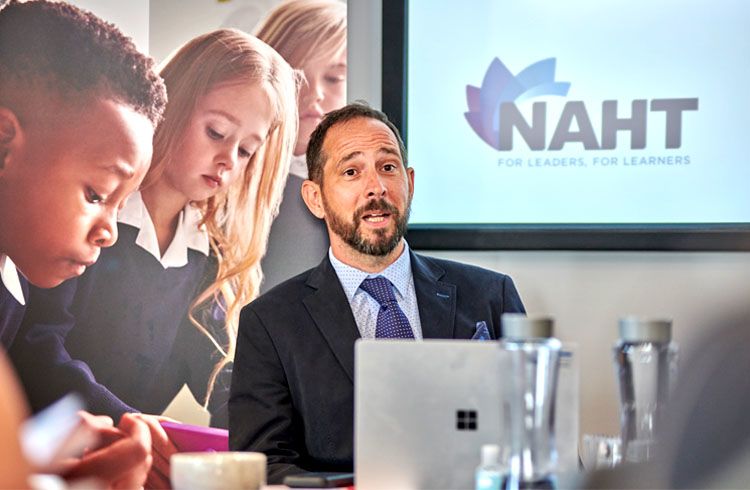
Adam Smith speaking at NAHT's event.
On top of this, the pandemic has increased supply/cover costs, which are not covered by our insurance, again creating a huge deficit. We have had no option but to put our pupils’ needs first and spend money we hadn’t budgeted for. This will mean reducing staffing costs this year and next; this means fewer pupils getting the support they need.
There have been additional covid-19-related cleaning costs. Staggered lunchtimes and breaks have increased our part-time staff costs, and we’ve had to cover for staff isolating or on sick leave. All of this adds up.
Yet, our ‘recovery’ allocation for this year is only £2,130. The government hasn’t reimbursed us for any of the costs incurred for covid-19 safety. This cost is being paid for by pupils having less.
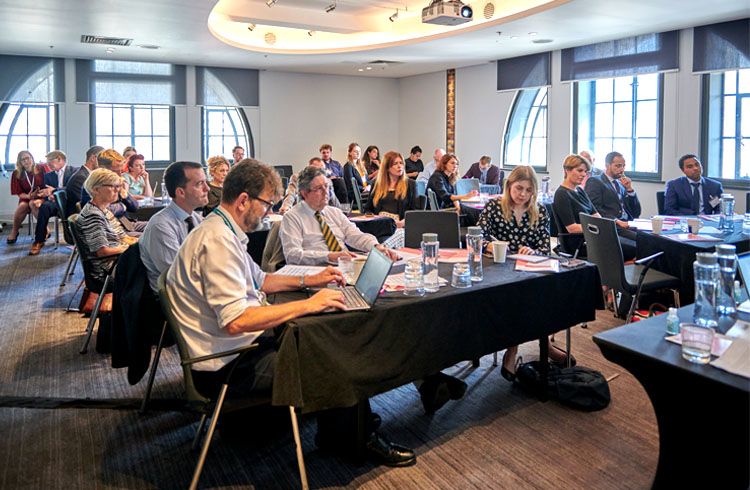
Many MPs and members were present for NAHT’s report launch.
Staff have spent years making the best of not having enough funding. Parents volunteer labour. The school PTA pays the music teacher’s salary, and staff have elected not to have pay increases to keep their TAs.
We need proper funding to do our job properly. The government promised schools they wouldn’t be left worse off because of the pandemic, that they would be correctly refunded for money spent following the guidance we were sent, and that simply hasn’t happened.

Adam Smith speaking at NAHT's event.
Adam Smith speaking at NAHT's event.

Many MPs and members were present for NAHT’s report launch.
Many MPs and members were present for NAHT’s report launch.



